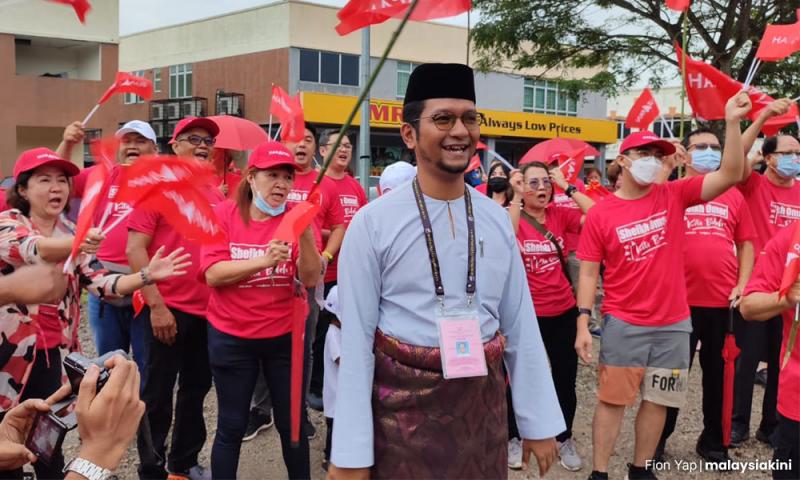
In Ayer Hitam, DAP's Malay-candidate gambit not paying dividends yet
GE15 | In their quest to unseat MCA president Wee Ka Siong in the Ayer Hitam parliamentary seat in Johor, DAP chose to field a Malay candidate, Sheikh Umar Bagharib Ali.
It is largely believed that the move is meant to make DAP more appealing to Malay voters - who in 2018, made up almost 58 percent of the constituency’s electorate.
On paper, if Sheikh Umar can get 10 to 15 percent of Malay votes and maintain a majority of support from the Chinese community - which has been a vote bank for DAP - he could win Ayer Hitam for Pakatan Harapan.
However, observations by Malaysiakini on the ground indicate that things aren’t going as planned.
While Sheikh Umar has been hard at work since before nomination day, meeting and greeting voters at Malay villages and warong (stalls) - and was received politely - many were not familiar with him.
During one meet-and-greet session, many of those he shook hands with asked where he was from, while a few of them, including some Harapan supporters, knew that he was the Paloh assemblyperson elected in 2018.
Among the few who recognised the DAP candidate was a traditional kuda kepang performer Hazim Mohamad, who recalled meeting Sheikh Umar during the Ayer Hitam Puteh Festival in 2018.
The festival was organised by Sheikh Umar when he was a Johor state exco member in charge of the creative economy for 22 months.
Hazim had welcomed Sheikh Umar and other Harapan campaigners to his house in Kampung Parit Bingan before introducing them to a nearby warong.

Sheikh Umar Bagharib Ali (first from left) and Ng Suee Lim (second from left) posing for photos with Ayer Hitam constituents
Kampung Parit Bingan is located under the Semarang state seat, about a 10-minute drive from Ayer Hitam town and the main toll exit.
In many kampung parit (trench villages) in Ayer Hitam and many parts of Johor, most of the residents are of Javanese descent and still speak the language.
But while Sheikh Umar can speak some of this dialect, he is not very fluent.
Instead, another DAP leader, Selangor state assembly speaker Ng Suee Lim - who is famous for his fluency in Javanese - served as the lubricant between Sheikh Umar and the locals.
While visiting the warong in the village, Ng would urge locals to vote for the Ayer Hitam hopeful - while also criticising BN for being corrupt.
At one warong, Sheikh Umar also delivered a brief speech to the 20 locals and introduced himself as a “Malay youth candidate” and asked for their support.
Kampung Parit Bingan is located under the Semarang state seat, about a 10-minute drive from Ayer Hitam town and the main toll exit.
In many kampung parit (trench villages) in Ayer Hitam and many parts of Johor, most of the residents are of Javanese descent and still speak the language.
But while Sheikh Umar can speak some of this dialect, he is not very fluent.
Instead, another DAP leader, Selangor state assembly speaker Ng Suee Lim - who is famous for his fluency in Javanese - served as the lubricant between Sheikh Umar and the locals.
While visiting the warong in the village, Ng would urge locals to vote for the Ayer Hitam hopeful - while also criticising BN for being corrupt.
At one warong, Sheikh Umar also delivered a brief speech to the 20 locals and introduced himself as a “Malay youth candidate” and asked for their support.
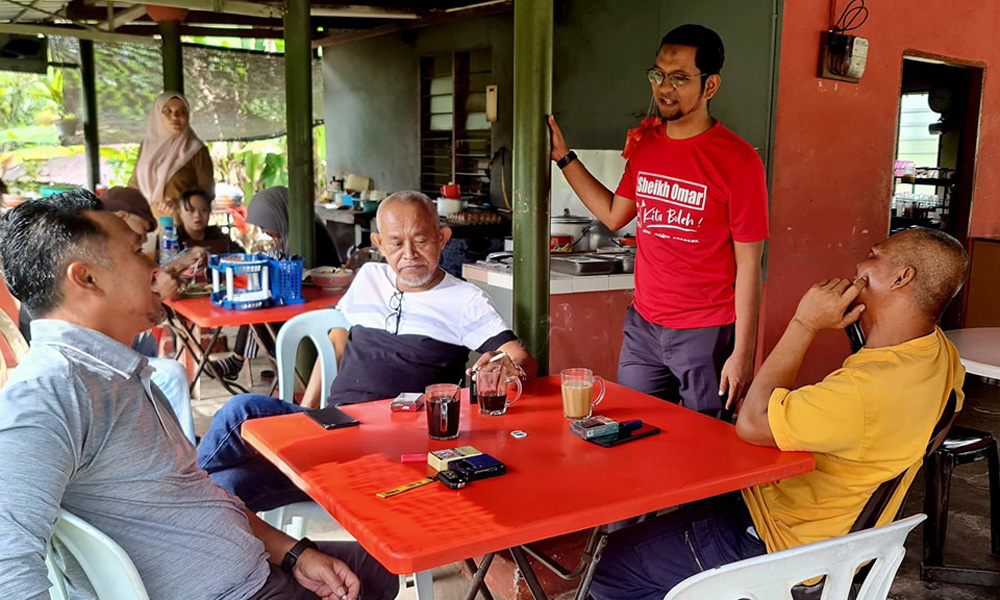
Sheikh Umar Bagharib Ali (standing) speaking to voters
Sticking with familiarity
However, after the DAP entourage left, the owner of the warong and two of his friends, who refused to be named, told Malaysiakini that they were all BN supporters and would not consider voting for Sheikh Umar just because he is a Malay.
They said that was the first time they met Sheikh Umar and were not familiar with his background and manifesto for Ayer Hitam.
Harapan’s messaging against corruption also didn’t resonate with them as they believe that all political leaders across the spectrum are not immune to corruption and the more important thing is to have resources to serve the local community.
The warong’s owner cited neighbouring constituency Sri Gading’s incumbent, Shahruddin Salleh, as an example, saying the Pejuang lawmaker rarely showed up, even when it was flooding.
They believed that this lack of aid for locals is because opposition MPs don’t have enough resources to help the people.
In contrast, they praised Wee for always being fast in responding to the people’s demands, giving them aid, including food baskets and donations during the pandemic, and regularly funding the mosques.
They also said Wee brought a lot of development to the area, including building roads and taking care of the people, regardless of ethnicity.
Sticking with familiarity
However, after the DAP entourage left, the owner of the warong and two of his friends, who refused to be named, told Malaysiakini that they were all BN supporters and would not consider voting for Sheikh Umar just because he is a Malay.
They said that was the first time they met Sheikh Umar and were not familiar with his background and manifesto for Ayer Hitam.
Harapan’s messaging against corruption also didn’t resonate with them as they believe that all political leaders across the spectrum are not immune to corruption and the more important thing is to have resources to serve the local community.
The warong’s owner cited neighbouring constituency Sri Gading’s incumbent, Shahruddin Salleh, as an example, saying the Pejuang lawmaker rarely showed up, even when it was flooding.
They believed that this lack of aid for locals is because opposition MPs don’t have enough resources to help the people.
In contrast, they praised Wee for always being fast in responding to the people’s demands, giving them aid, including food baskets and donations during the pandemic, and regularly funding the mosques.
They also said Wee brought a lot of development to the area, including building roads and taking care of the people, regardless of ethnicity.
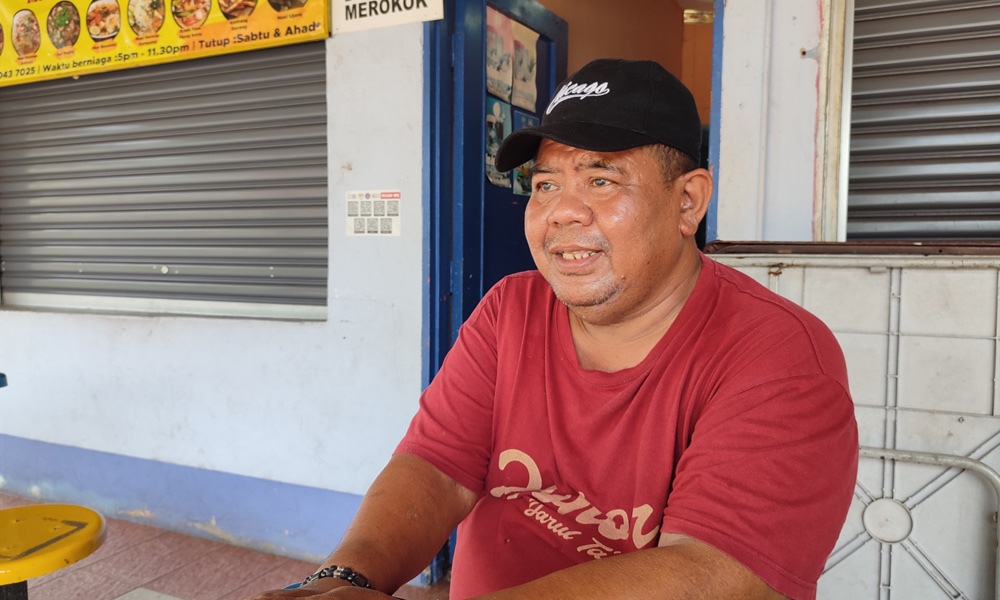
In Yong Peng, a 56-year-old food stall owner, Yahya Surataman (above) said he would still vote for BN although he felt a bit disappointed with the ruling party as his application to get a local council stall was not approved after several years.
“I don’t know how to explain it, but my father told us to do so (vote BN) as before, and we will follow. As for my disappointment (over the stall), we will file a complaint to the local council,” Yahya told Malaysiakini.
No hope for Harapan?
Harapan’s unpopularity among Ayer Hitam’s Malays can be observed from the election results in the Semarang state seat - a BN stronghold and the parliamentary constituency’s Malay enclave.
In 2018, when it had Bersatu’s support, Harapan only managed to secure 23 percent of the votes in Semarang, despite the strong anti-BN sentiment that was sweeping large swathes of Johor from north to south.
This performance declined further in the 2022 state election where the PKR candidate, Haryati Abu Nasir, lost her deposit after receiving only 7.4 percent of the votes.
It gets worse for DAP, as according to Harapan’s internal analysis - the party only received 5 percent of Malay votes in the entire Johor state election.
Unlike seats in the southern belt where the total number of voters dropped considerably during the state election in March, compared to the 14th general election in 2018, in Semarang the number of voters was almost the same.
BN even managed to increase the number of votes it received in Semarang by around 400.
However, the total turnout in the state seat - like in many others - did not reflect the rise in new voters after 2018 and the implementation of Undi18 and automatic voter registration.
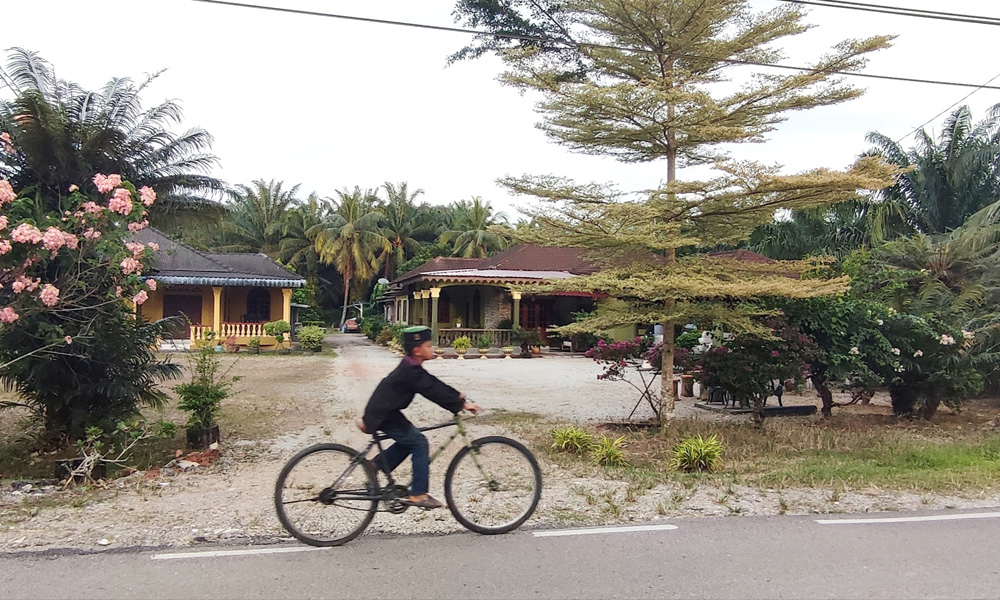
Exploiting communal sentiments for Chinese vote
Nevertheless, the strong support for BN is expected to guarantee that most of Ayer Hitam’s Malay votes will go to Wee.
Wee also claimed to have secured the support of Ayer Hitam’s Indian voters, who made up about four percent of the electorate in 2018.
While that alone may be enough to secure him a victory, as MCA president, the incumbent is determined to get at least some Chinese votes to ensure a more comfortable win for himself.
To achieve this, Wee and his supporters are appealing to communal sentiments.
On Nov 4, the eve of Nomination Day, Wee attended a dinner organised by the Yong Peng Vegetable Farmers’ Association and was welcomed by more than 300 locals.
In the opening speech, Yong Peng Vegetable Farmers’ Association chairperson Cheng Tai Hoe said Wee is the Malaysian leader who is most likely to meet Chinese President Xi Jinping.
Nevertheless, the strong support for BN is expected to guarantee that most of Ayer Hitam’s Malay votes will go to Wee.
Wee also claimed to have secured the support of Ayer Hitam’s Indian voters, who made up about four percent of the electorate in 2018.
While that alone may be enough to secure him a victory, as MCA president, the incumbent is determined to get at least some Chinese votes to ensure a more comfortable win for himself.
To achieve this, Wee and his supporters are appealing to communal sentiments.
On Nov 4, the eve of Nomination Day, Wee attended a dinner organised by the Yong Peng Vegetable Farmers’ Association and was welcomed by more than 300 locals.
In the opening speech, Yong Peng Vegetable Farmers’ Association chairperson Cheng Tai Hoe said Wee is the Malaysian leader who is most likely to meet Chinese President Xi Jinping.
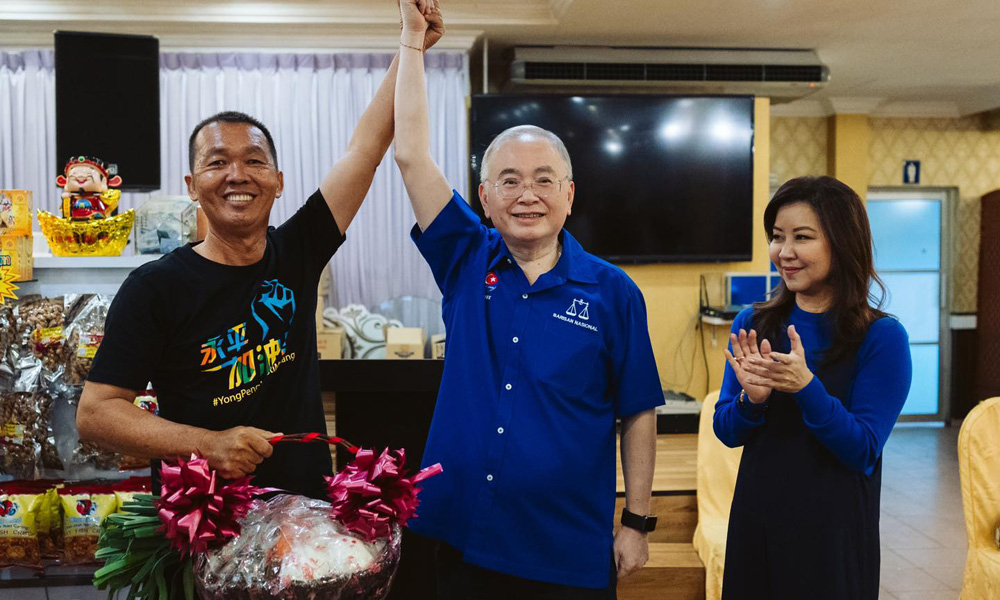
Wee Ka Siong (centre)
With the advantages of language and culture, he said, Wee could help local farmers export durian, oil palm and other crops to China.
“In the past, the economic lifeblood of Yong Peng was oil palm and in the future, it will be durian.
“Next year, the Philippines’ durian will enter the China market and become a competitor to Malaysia.
“We must think twice if we want Wee or fellow Malay leaders to help us to export durian and oil palm to China,” Cheng said.
Meanwhile, in his speech, Wee recounted his past achievements, including securing full government funding to set up SJKC Yong Peng 2 after winning more than 85 percent of the Chinese vote during the 2004 general election and securing more than RM140 million for the Tunku Abdul Rahman University College (TAR UC) from 2020 to date, among others.
He also criticised DAP, which had 42 MPs, for not only failing to give more funding to TAR UC but actually reducing their funding when the party’s chairperson Lim Guan Eng was the finance minister.
Lim had argued that he was willing to allocate funds to TAR UC if MCA relinquished control of the varsity.
During the dinner in Ayer Hitam, Wee’s supporters also shouted “vote Wee for the hometown”, and held up a banner praising Wee for defending the rights and interests of the Chinese community.
With the advantages of language and culture, he said, Wee could help local farmers export durian, oil palm and other crops to China.
“In the past, the economic lifeblood of Yong Peng was oil palm and in the future, it will be durian.
“Next year, the Philippines’ durian will enter the China market and become a competitor to Malaysia.
“We must think twice if we want Wee or fellow Malay leaders to help us to export durian and oil palm to China,” Cheng said.
Meanwhile, in his speech, Wee recounted his past achievements, including securing full government funding to set up SJKC Yong Peng 2 after winning more than 85 percent of the Chinese vote during the 2004 general election and securing more than RM140 million for the Tunku Abdul Rahman University College (TAR UC) from 2020 to date, among others.
He also criticised DAP, which had 42 MPs, for not only failing to give more funding to TAR UC but actually reducing their funding when the party’s chairperson Lim Guan Eng was the finance minister.
Lim had argued that he was willing to allocate funds to TAR UC if MCA relinquished control of the varsity.
During the dinner in Ayer Hitam, Wee’s supporters also shouted “vote Wee for the hometown”, and held up a banner praising Wee for defending the rights and interests of the Chinese community.
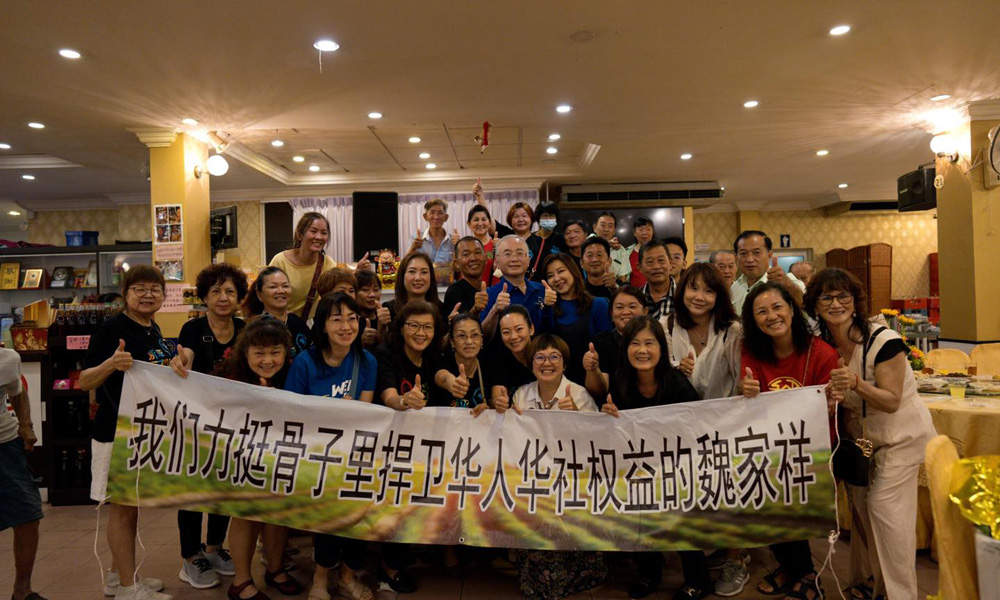
Wee Ka Siong (centre) posing for photos with supporters
Also in attendance was Yong Peng assemblyperson Ling Tian Soon.
Ling, who is the MCA organising secretary, thanked the crowd for turning up and said there were more attendees that night than during a dinner before the 2018 polls, in which only 40 to 50 people showed up.
DAP banking on voters who sat out state polls
Yong Peng, the Chinese enclave of Ayer Hitam, is the second of two state seats in the constituency.
After being in DAP control since 2013, the seat was recaptured by MCA during this year’s state election.
In the March polls, DAP’s total votes in Yong Peng dropped from 12,307 in the last general election to 7,129, while BN increased its total votes from 7,218 to 9,870.
Part of the reason for this shift is that, unlike in Semarang, the total turnout was much lower than in 2018, with about 2,000 fewer votes cast - on top of all the missing new voters.
This, DAP, hopes, will be the missing ingredient that turns its fate around on Nov 19.
Several Ayer Hitam residents Malaysiakini met said that their children who live and work in Singapore could not return home for the state election due to the pandemic.
But with the Covid-19 pandemic ebbing and the Malaysia-Singapore border fully reopened, it’s believed that the turnout rate for the GE15 election would be higher.
Outstation and overseas voters - who work in urban areas and have access to alternative sources of information than those aligned with the government - are usually seen as more likely to support the opposition.
According to the Election Commission, Ayer Hitam currently has about 61,000 voters - about 15,000 more than the 46,000 registered voters in 2018.
Among the 15,000 new voters, 3,847 of them are aged between 18 and 20.
However, as Undi18 and automatic voter registration only took effect this year, it is difficult to predict the voting trend of the new voters.
There is also no guarantee that those registered automatically will turn up to vote or if they will stay home due to disinterest in the political process.
Also in attendance was Yong Peng assemblyperson Ling Tian Soon.
Ling, who is the MCA organising secretary, thanked the crowd for turning up and said there were more attendees that night than during a dinner before the 2018 polls, in which only 40 to 50 people showed up.
DAP banking on voters who sat out state polls
Yong Peng, the Chinese enclave of Ayer Hitam, is the second of two state seats in the constituency.
After being in DAP control since 2013, the seat was recaptured by MCA during this year’s state election.
In the March polls, DAP’s total votes in Yong Peng dropped from 12,307 in the last general election to 7,129, while BN increased its total votes from 7,218 to 9,870.
Part of the reason for this shift is that, unlike in Semarang, the total turnout was much lower than in 2018, with about 2,000 fewer votes cast - on top of all the missing new voters.
This, DAP, hopes, will be the missing ingredient that turns its fate around on Nov 19.
Several Ayer Hitam residents Malaysiakini met said that their children who live and work in Singapore could not return home for the state election due to the pandemic.
But with the Covid-19 pandemic ebbing and the Malaysia-Singapore border fully reopened, it’s believed that the turnout rate for the GE15 election would be higher.
Outstation and overseas voters - who work in urban areas and have access to alternative sources of information than those aligned with the government - are usually seen as more likely to support the opposition.
According to the Election Commission, Ayer Hitam currently has about 61,000 voters - about 15,000 more than the 46,000 registered voters in 2018.
Among the 15,000 new voters, 3,847 of them are aged between 18 and 20.
However, as Undi18 and automatic voter registration only took effect this year, it is difficult to predict the voting trend of the new voters.
There is also no guarantee that those registered automatically will turn up to vote or if they will stay home due to disinterest in the political process.
No comments:
Post a Comment